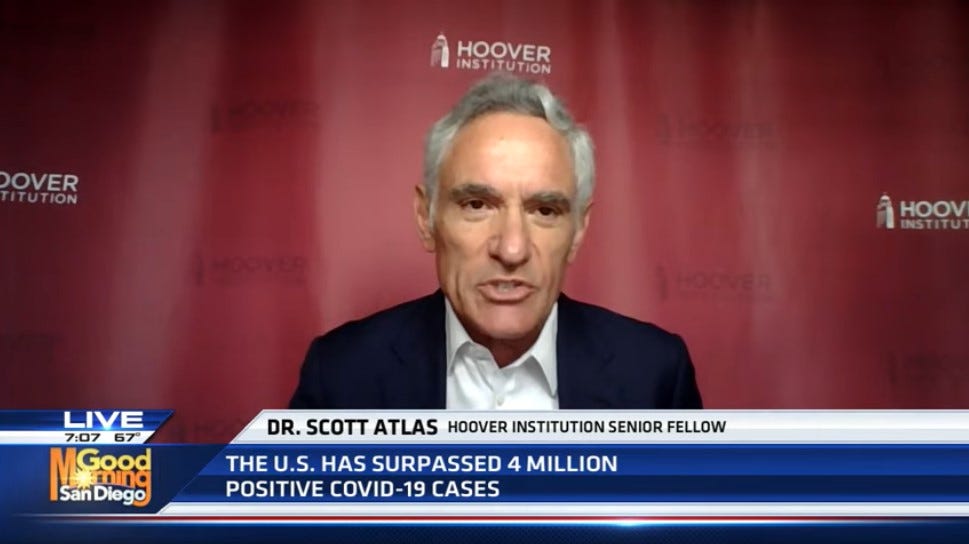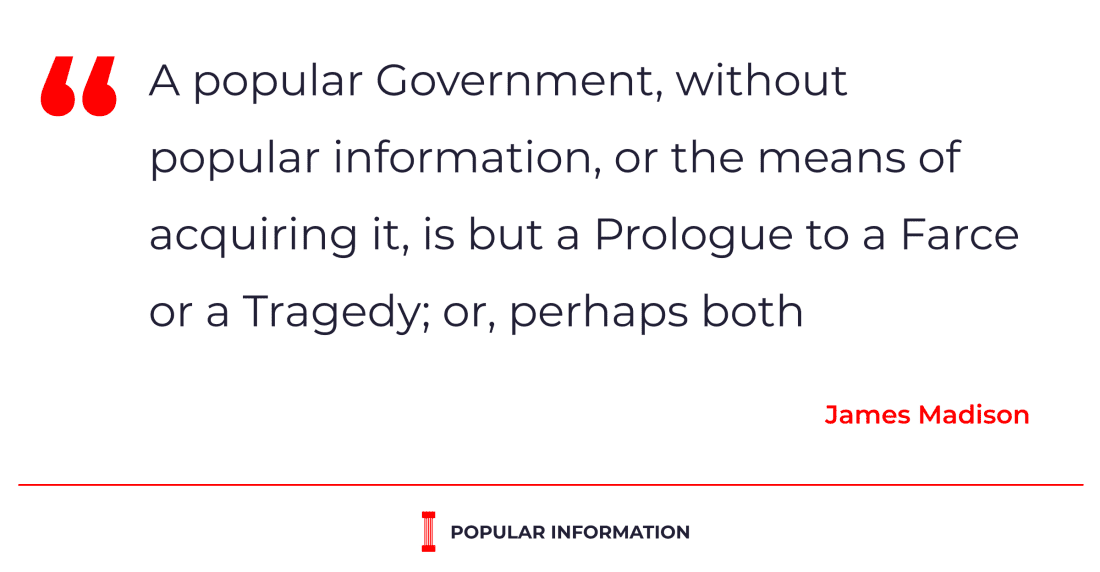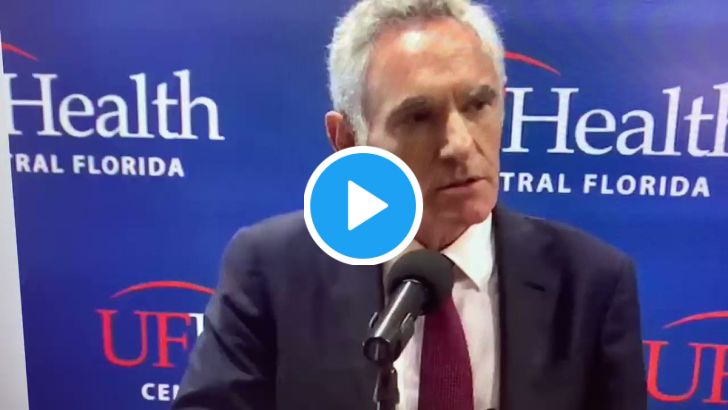 |
Anthony Fauci, one of the nation's leading experts on infectious diseases, has been sidelined. Fauci has not appeared with Trump at a coronavirus briefing since April 22. Instead, Fauci has attempted to communicate accurate scientific information through media appearances — while Trump undermines Fauci's message via Twitter.
Trump has installed Scott Atlas, a frequent guest on Fox News, to effectively replace Fauci. Although Atlas is a doctor, he is wildly unqualified for the role. Atlas is not an infectious disease expert or epidemiologist. He is a radiologist. His 159-page CV contains no references to "epidemiology," "epidemic," "virus," or "viral."
Atlas' primary qualification is that he tells Trump what he wants to hear. Atlas has called for the reopening of schools, raised doubts about the efficacy of masks, criticized lockdowns, and downplayed the importance of testing. These positions are not supported by reliable scientific evidence. And they are rejected by subject-matter experts. But those positions, because they are favored by Trump, have put Atlas at the center of the federal government response to the pandemic.
Atlas, according to Politico, is "part of a tiny group of advisers who meet every morning to chart the daily response to Covid-19." The group also includes Jared Kushner and Steven Miller, two other people with no qualifications to be involved in such an effort.
On Monday, the Washington Post reported that Atlas is using his new influence to push Trump toward a "herd immunity" strategy. That involves allowing the virus to quickly spread through the population, while protecting some vulnerable groups, to allow most people to build immunity to the coronavirus. It has been pursued in Sweden with disastrous results.
Achieving herd immunity would require 65 to 70 percent of the American population to contract COVID-19. Assuming a 1% fatality rate, that would mean 2.13 million deaths.
The stark numbers have not dissuaded Atlas. While promoting the reopening of schools in Florida on Monday, Atlas described the potential for children to spread the virus to adults as "icing on the cake."
But Atlas' issues extend beyond his lack of qualifications and dangerous policy prescriptions. He also holds numerous positions in the corporate world that create conflicts of interest. While playing a central role in the federal government's multi-trillion dollar coronavirus response, Atlas holds leadership and advisory positions with pharmaceutical companies, a healthcare diagnostic company, and a medical venture capital firm.
Atlas' corporate positions in the healthcare industry
Atlas is currently an "international advisor" and board member for TechTools, a medical venture capital firm based in Brazil. The company "primarily invests in health technology and innovation." Atlas' position at the center of the White House's pandemic response gives him valuable insight into what types of investments in the healthcare field are likely to be profitable.
Atlas is also the Chairman of the Board of AlzecoBio, a "healthcare diagnostic company." The company is "focused on developing novel MRI-based targeted imaging agents for the early diagnosis of Alzheimer’s disease and other neurodegenerative disorders." While this seems unrelated to the pandemic, the company is also a startup that has been actively raising money to fund its operations. Atlas' powerful role in the White House — and his influence over billions in pandemic response funds — could give him access to the investors he needs to grow the company.
Atlas' ties to the pharmaceutical industry
In preparation for Congressional testimony last December, Atlas submitted his CV, dated September 1, 2019. Atlas' CV includes a list of "Scientific and Medical Advisory Boards, and Corporate Boards, Current and Past."
That list reveals Atlas' ties to several pharmaceutical advisory boards. Specifically, Atlas is or was a member of advisory boards for Bristol Myers Squibb and Sanofi. While it is not known if Atlas is paid for his work, these "positions typically pay well."
Sanofi is actively developing a vaccine candidate and has already secured a $2.1 billion grant from the federal government for Project Warp Speed. Atlas may be holding an influential role in the White House's coronavirus response while simultaneously working with Sanofi.
Atlas also reported a similar role with Bristol Myers Squibb. That company "has a proof-of-concept clinical trial in progress to assess the safety and efficacy of ORENCIA® (abatacept) in hospitalized patients with COVID-19 due to severe acute respiratory syndrome coronavirus 2 (SARS-CoV-2)." It is also "one of 15 companies participating in the Bill & Melinda Gates Foundation’s COVID-19 Therapeutics Accelerator to identify concrete actions to accelerate treatments, vaccines, and diagnostics in the field."
Do Atlas' positions with pharmaceutical companies influence his views? He has consistently advocated policy positions that benefit the industry. For example, in a 2018 column published on CNN, Atlas defended the drug industry's practice of charging Americans higher prices than the rest of the world.
Not surprisingly, prices and profit margins for prescription drugs in the United States dwarf those in foreign markets. It is obvious that economics represent a key incentive for the constant innovation and first access to life-saving drugs that Americans enjoy. Indeed, that is the conundrum: The same policies that are associated with the lower prices seen in other countries -- price regulation and weaker patent rights -- are also those that are typically associated with delayed launches and reduced access to drugs.
He wrote similar pieces, promoting positions favored by the pharmaceutical industry, in 2017, 2019, and 2020.
"The Trump Administration has serious credibility problems right now when it comes to all things science and public health. Elevating the voice of someone with such close ties to the pharmaceutical industry and such dangerous views on how we should be responding to COVID-19 is absolutely the wrong direction for them to be moving if they want to restore the public's trust," Eli Zupnick, a spokesman for the watchdog group Accountable Pharma, said.
Why don't we know more about Atlas' financial conflicts?
There is a lot we don't know about Atlas' financial conflicts. The White House has even "declined to say whether Atlas was receiving a taxpayer-funded salary."
It's part of a pattern of shielding the people involved in the pandemic response from government rules around disclosure and conflicts of interest. Moncef Slaoui, who is heading up the White House's $10 billion vaccine development program, was hired as an "outside contractor." This allows him to lead the project while continuing "to invest in pharmaceutical companies." The arrangement also allows Slaoui "to avoid disclosing potential conflicts of interest." The White House has hired "several other consultants" with ties to the drug industry with the same arrangement.
Atlas' arrangement is even more opaque. There is no indication he was required to step down from any of his corporate positions as a condition of accepting the role.
 |



